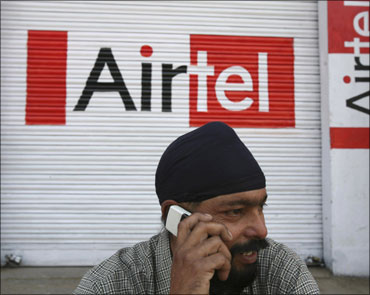Photographs: Reuters BS Reporter in Mumbai
While the 3G bid prices were labelled aggressive as they climbed new heights each day, the bid results also show telecom companies maintained a conservative stance by bidding selectively.
Industry experts have mixed reactions on the results: While some are happy that no company has spent around Rs 16,750 crore (Rs 167.50 billion) for a pan-India licence, some lament that lack of coverage will result in long-term competitive disadvantage.
Meanwhile, markets were nervous about telco stocks, with Bharti, Idea and Tata Teleservices Maharashtra gaining marginally (below one per cent), while Reliance Communications dipped 0.73 per cent in on Thursday's trade.
Though uncertainty over 3G spend has ended, brokerages pointed at downside risks on account of 3G rollout costs. Goldman Sachs has decreased the 2010-11 earnings per share estimates for Bharti Airtel by 9 nine per cent, Reliance Communications by 12 per cent and Idea by 11 per cent.
While many GSM players chose those circles where they are strong in 2G subscription and revenue, Idea Cellular has achieved the perfect balance.
It has won licences in 11 circles, with a payout of Rs 5,768 crore (Rs 57.68 billion). They have avoided the metros, especially Delhi and Mumbai which has seen the most aggressive bidding. The prices paid for these circles are higher than that of 3G auctions in the UK and Germany.
. . .
Good, bad and clever: 3G bidding strategies
Photographs: Reuters
"As Idea is the most exposed to the less expensive circles, it has managed to win licences covering 77 per cent of its subscriber base," said a report by brokerage firm New Street research.
Experts say dual technology operators have done opportunistic bidding. Reliance Communications has won 13 licences, including the metros, and Tata Teleservices has won nine circles, including Maharashtra.
Some feel these companies will use their technological advantage to offer similar services and hence have not gone all out for 3G spectrum.
"CDMA players already offer some services which are like 3G. They would probably go in for a combination of EVDO technology to provide data along with GSM for voice services. There are handsets where this is possible like some phones which offer CDMA and GSM technology together," says Alok Shende, principal analyst and founder-director of consulting firm Ascentius.
Bharti Airtel has chosen the metros and category A circles like Andhra Pradesh, Karnataka, Tamil Nadu, among others. These circles accounted for 63 per cent of its 2G subscribers and 68 per cent of its revenues.
The company has played safe by retaining metros which have the maximum 3G potential, and covered over two-thirds of its 2G revenues through the circles it has won 3G spectrum in.
. . .
Good, bad and clever: 3G bidding strategies
Photographs: Reuters
"Bharti in all its circles where it has won 3G spectrum commanded a 2G revenue market share of 35 per cent reflecting a strong positioning vis-a-vis competition," says Harit Shah, analyst, Karvy Broking.
Vodafone, too, went in the same lines as Bharti by retaining its presence in metros.
Analysts feel newcomer Aircel, which has won in 13 circles, has stretched its balance sheet with a payout of Rs 6,499 crore (Rs 64.99 billion), even as it bid for some of the lowest priced circles. The company has also won the auction in nine circles where it is not among the top four players. Merill Lynch says Aircel appears to be the highest bidder for 3G at 1.5 times its revenue.
BWA spectrum bidding, which is slated to start soon, might also throw up as many surprises. Around 11 companies will be participating in this bid process where two to three slots per circle are put on block.
"Companies which have relinquished some circles for 3G will try to make up for this in BWA spectrum. There will be some pressure if you see the ratio between reserve prices and auction prices, as the reserve prices are lower for BWA, ratios will be much sharper," said Shende.





article